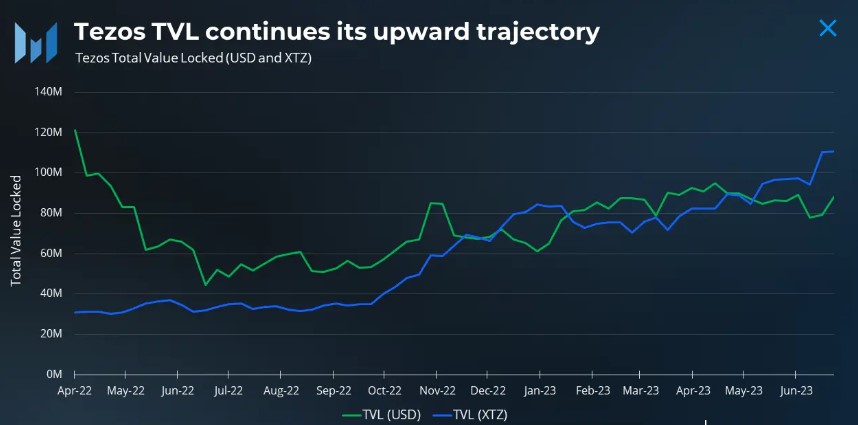According to a recent report by crypto research firm Messari, Tezos has been progressing in its roadmap development, with several new features and upgrades being introduced to the network.
The platform’s core developers have announced a strategic shift to hybrid optimistic/zk rollups, with multiple teams committed to building rollups that will enable the platform to process more transactions per second (TPS) and enhance scalability.
Tezos DeFi Ecosystem Booms
Per the report, the recent launch of the 14th network upgrade, Nairobi, has brought improvements to the platform, new rollup functionality, and enhanced attestations.
In addition, Tezos core developers have unveiled the Data Availability Layer (DAL), which operates in parallel with Tezos Layer-1 and ensures data availability while scaling bandwidth and storage capacity.
Tezos has also been experiencing growing traction in the Decentralized Finance (DeFi) space, with the Total Value Locked (TVL) nearly doubling in the past year. The platform is seeing the launch of several new DeFi protocols, including novel DEXs, lending protocols, and perps protocols.
To further support the growth of the Tezos ecosystem, the XTZ Ecosystem DAO has been introduced to manage and distribute XTZ, Tezos’ native token, to support community initiatives.
Nevertheless, despite experiencing a strong Q1 2023, with market capitalization surging from $0.66 billion to $1.03 billion (+55%), outperforming the broader market by 9%, the platform saw a 30% Quarter-over Quarter (QoQ) drop in Q2, ending the quarter with a market capitalization of $0.72 billion, primarily following the SEC’s complaints against Binance and Coinbase.
Furthermore, the total crypto market capitalization during Q2 increased by 2%, driven by Bitcoin and Ethereum, which saw a 7% and 6% rise, respectively, propelled by the introduction of Bitcoin Spot Exchange-Traded Funds (ETFs).
On the other hand, Tezos’ revenue, measured by total gas fees spent (excluding storage costs), experienced an 82% QoQ decrease in Q2, primarily influenced by a 79% decrease in the average transaction fee.
The reduction in the average transaction fee was attributed to the decline of the XTZ price and a slowdown in NFT front-running bidding activities.
Fixed Inflation Rate And Burn Mechanisms
Tezos’ native token, XTZ, serves multiple functions within the network, including staking, governance, and payment for gas fees.
The token has a fixed annual inflation rate of…
Click Here to Read the Full Original Article at NewsBTC…
























